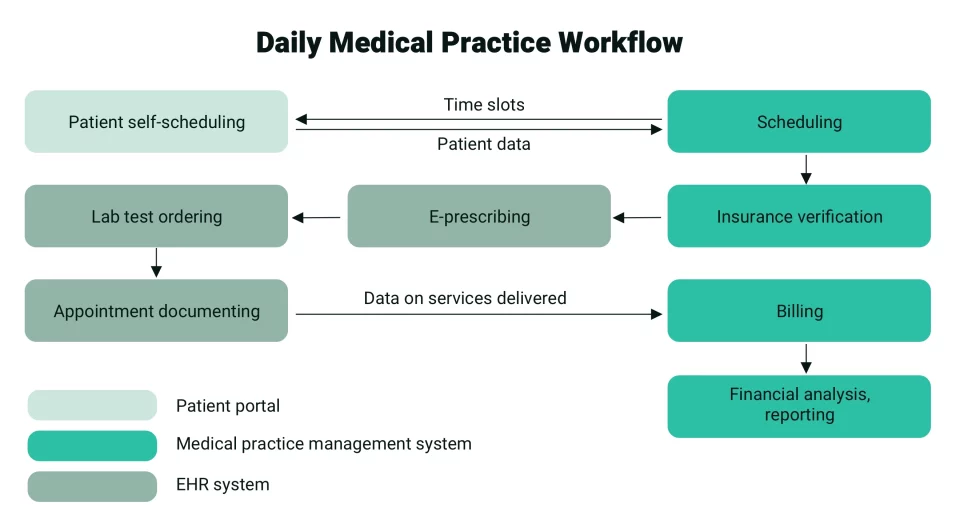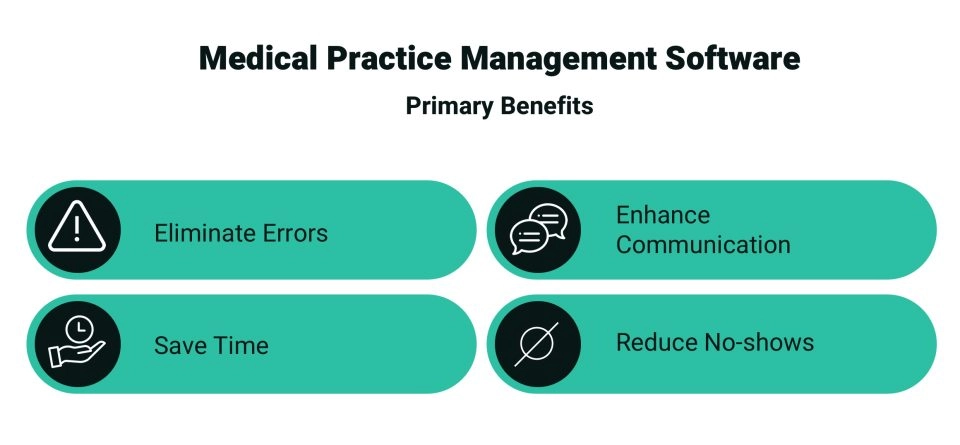INTRODUCTION
Prevalence of medical practice management software
In today’s fast-paced healthcare landscape, integrating digital solutions is no longer optional—it’s essential. Administrative burdens, regulatory compliance, and patient expectations have grown exponentially, making manual processes inefficient and prone to errors. Modern medical practices need robust tools to meet these challenges head-on, ensuring smooth operations while prioritizing patient care.
This is where medical practice management software (MPMS) is a game-changer. By streamlining administrative tasks, enhancing data accuracy, and ensuring regulatory compliance, MPMS empowers healthcare providers to focus on what matters most: delivering quality care. Its role extends beyond scheduling and billing, encompassing critical functions that drive a practice's efficiency and effectiveness.
Designed with healthcare’s unique complexities in mind, MPMS combines cutting-edge technology with intuitive usability, making it indispensable for practices of all sizes. From simplifying appointment management to enhancing patient communication and ensuring secure data handling, its features address the diverse needs of modern medical offices. Let’s explore the six main features that make this software a cornerstone of efficient healthcare administration.
DEFINITION
What is medical practice management software?
In an era where efficiency and precision define success in healthcare, medical practices are turning to digital solutions to meet growing demands. Medical practice management software (MPMS) has become a cornerstone of modern healthcare operations. This transformative tool is designed to streamline the administrative and operational tasks that can otherwise bog down medical practices, allowing providers to focus on delivering exceptional patient care.
At its core, MPMS is a comprehensive software solution tailored to healthcare practices. It automates critical functions such as patient scheduling, billing, claims processing, and medical record management. By centralizing these processes into a user-friendly platform, MPMS minimizes manual errors, enhances data accuracy, and improves workflow efficiency. Whether reducing the time spent on appointment scheduling or ensuring timely insurance reimbursements, this software takes the complexity out of day-to-day practice management.
The adoption of MPMS is rapidly increasing across healthcare sectors, driven by the mounting operational challenges of evolving regulations and growing patient loads. Practices are under immense pressure to remain compliant with industry standards while simultaneously meeting the high expectations of tech-savvy patients. MPMS addresses these issues by offering features that simplify compliance management, enhance communication, and optimize resource utilization, making it an indispensable tool for small clinics and large healthcare organizations.
Moreover, MPMS is not just about automation; it’s about creating a seamless experience for providers and patients alike. Its ability to integrate with electronic health records (EHRs), telehealth platforms, and other healthcare IT systems fosters a connected ecosystem that enhances decision-making and care delivery. As the healthcare industry embraces digital transformation, MPMS stands out as a pivotal solution for overcoming operational challenges and achieving sustainable growth. Medical practice management software automates the above process
Medical practice management software automates the above process
Want to simplify your administrative and operational management tasks?
MAIN FEATURES
Key medical practice management software features
In today’s digitized world, where the healthcare industry is making breakthroughs with automation, it has become crucial to adapt to modern medical practices to offer premium care to patients. A custom medical practice management software improves the operational efficiency of a hospital, clinic, or healthcare enterprise through its varied features that include:
Appointment scheduling
Scheduling appointments is a medical practice's most fundamental yet time-consuming task. Traditional methods often lead to inefficiencies, such as double bookings, scheduling conflicts, and long patient wait times. However, automated appointment scheduling in medical practice management software (MPMS) has revolutionized this process, dramatically reducing administrative burdens and improving operational efficiency.
Automated scheduling eliminates the need for manual updates and constant phone calls, allowing staff to focus on more critical responsibilities. With features like drag-and-drop interfaces and real-time availability tracking, MPMS ensures appointments are booked accurately and efficiently. The system also reduces errors by flagging potential conflicts and providing adequate time allotted for each patient based on the type of appointment or provider’s availability.
A key advantage of MPMS is its integration with patient portals, which empowers patients to take control of their scheduling. Through the portal, patients can book, reschedule, or cancel appointments at their convenience without contacting the office. This self-scheduling capability not only reduces the workload on administrative staff but also enhances the patient experience by offering greater flexibility and transparency.
Moreover, automated reminders—sent via email, SMS, or app notifications—further optimize scheduling by reducing no-show rates. These reminders can include instructions, such as pre-appointment preparation or telehealth login details, ensuring patients are well-informed.
The benefits extend beyond efficiency; automated scheduling contributes to better resource utilization. Practices can monitor provider availability, exam room occupancy, and equipment usage, ensuring resources are allocated effectively. This holistic approach to appointment management helps practices deliver a smoother, more patient-centric experience, ultimately improving satisfaction for both staff and patients.
Billing and claims management
Billing and claims management are critical yet notoriously challenging aspects of running a medical practice. Errors, delays, and denials in claims can lead to financial strain and administrative headaches. Medical practice management software (MPMS) transforms this process with streamlined, automated solutions that simplify billing and expedite claims submission, ensuring smoother financial operations for healthcare providers.
One of the standout features of MPMS is its ability to automate billing processes. The software ensures that financial workflows are efficient and error-free by generating accurate invoices, verifying insurance eligibility, and integrating with electronic health records (EHRs). Administrative staff no longer have to sift through piles of paperwork or manually cross-check insurance details, significantly reducing the risk of errors that could lead to claim rejections.
Regarding claims submission, MPMS excels by enabling electronic filing directly to insurance providers. This speeds up the reimbursement process and minimizes common issues like missing information or non-compliance with payer-specific requirements. Many MPMS platforms include built-in compliance tools that automatically flag potential errors before submission, ensuring that claims meet regulatory standards.
Faster and more reliable reimbursements are a significant advantage for practices adopting MPMS. By automating tedious processes and reducing claim rejections, the software helps maintain a steady cash flow, which is crucial for the financial health of any practice. Additionally, real-time tracking of claim statuses allows administrators to address issues, minimizing delays proactively.
For patients, streamlined billing processes enhance trust and transparency. Features like itemized invoices, easy-to-understand payment breakdowns, and automated reminders for outstanding balances improve the overall experience. With MPMS, practices can ensure financial accuracy and efficiency, allowing providers to focus on what truly matters: delivering quality patient care.
Patient data management
Accurate and organized patient data is the foundation of effective care in healthcare. Managing this wealth of information manually can be overwhelming and prone to errors, so medical practice management software (MPMS) has become indispensable. By offering robust patient data management features, MPMS ensures that medical practices can store, organize, and access critical information seamlessly.
MPMS is a centralized repository for all patient-related data, from medical histories and treatment plans to contact information and insurance details. This centralized system eliminates the inefficiencies of paper records and scattered digital files, allowing providers and staff to retrieve patient data with a few clicks. Whether scheduling follow-ups, verifying insurance, or reviewing past treatments, the software streamlines every step, enabling a more efficient and accurate workflow.
Integrating electronic health records (EHRs) is a game-changer in patient data management. By syncing with EHRs, MPMS allows providers to view a patient’s complete medical history in one place, including lab results, imaging reports, and medication lists. This integration fosters continuity of care, particularly for patients with chronic conditions or complex medical needs, by ensuring that all relevant information is readily accessible during consultations.
The benefits of EHR integration extend beyond clinical efficiency. MPMS ensures compliance with data-sharing regulations, such as HIPAA, by providing secure access and robust audit trails. Features like role-based access controls protect sensitive data while allowing authorized staff to perform their duties without delays.
Additionally, MPMS supports patient engagement by enabling patients to upload documents or update personal information through integrated portals. This streamlines administrative processes, reduces redundant paperwork, and enhances communication between patients and providers. With MPMS, practices can prioritize data integrity and patient satisfaction, ensuring a high standard of care delivery.
Reports and analytics
In today’s data-driven world, healthcare practices that harness the power of analytics gain a significant edge in efficiency and decision-making. Medical practice management software (MPMS) offers robust reporting and analytics tools that transform raw data into actionable insights, enabling practices to optimize financial and operational performance.
A standout feature of MPMS is its customizable reporting capabilities. Practices can generate tailored reports on various aspects of their operations, including appointment trends, patient demographics, revenue cycles, and staff productivity. These reports provide a clear, real-time view of key performance indicators (KPIs), helping administrators identify strengths, weaknesses, and opportunities for improvement. With this level of detail, practices can make more informed decisions to streamline workflows and enhance patient care.
Financial decision-making is one area where MPMS truly shines. The software allows practices to track revenue patterns, outstanding balances, and claim approvals, making it easier to manage cash flow and reduce bottlenecks. For example, identifying delays in claims processing through analytics helps practices address specific issues proactively, improving the reimbursement cycle. Additionally, financial forecasting tools within MPMS offer predictive insights, enabling practices to plan strategically for future growth or resource allocation.
Operationally, reporting tools empower practices to optimize day-to-day functions. For instance, analyzing patient no-show rates can inform strategies like improved appointment reminders or flexible scheduling options. Similarly, identifying underutilized resources, such as exam rooms or staff hours, helps improve resource allocation.
These data insights don’t just benefit administrators; they also enhance patient care. By identifying patient needs or outcome trends, practices can tailor services to meet evolving demands. With MPMS’s reporting and analytics, healthcare providers gain the clarity needed to thrive in a competitive environment while delivering superior patient care.
Task and workflow automation
Managing a medical practice involves juggling countless tasks, from appointment reminders to follow-ups on test results. These repetitive administrative duties can overwhelm staff, leading to inefficiencies and errors. Medical Practice Management Software (MPMS) transforms this dynamic by introducing task and workflow automation, freeing staff to focus on higher-value responsibilities while ensuring seamless operations.
One of the most impactful features of MPMS is its ability to automate appointment reminders. Instead of relying on manual phone calls or emails, the software sends timely reminders via SMS, email, or app notifications. These automated reminders reduce no-show rates and eliminate the need for staff to dedicate hours to contacting patients individually. Customization options allow practices to include detailed instructions, such as preparation requirements or telehealth login details, enhancing the patient experience.
Follow-ups, another traditionally time-consuming task, are also simplified through automation. For example, after a patient visit, the software can automatically schedule follow-up appointments, send reminders about lab results, or prompt patients to complete surveys. These features ensure that critical tasks are not overlooked, improving patient engagement and continuity of care.
Beyond reminders and follow-ups, MPMS automates several other processes, such as generating invoices, verifying insurance eligibility, and even notifying staff of overdue tasks. This functionality reduces administrative bottlenecks and minimizes errors that could arise from manual handling.
The impact on staff workload is profound. By handling repetitive tasks, MPMS allows employees to focus on more meaningful work, such as improving patient interactions or managing practice growth. Additionally, automated workflows promote consistency and accuracy across operations, creating a more organized and efficient practice environment. With task and workflow automation, MPMS helps practices achieve operational excellence while enhancing staff and patient satisfaction.
Compliance and security features
In an era where data breaches and regulatory scrutiny are at an all-time high, safeguarding sensitive patient information is more than necessary—it’s a mandate. Medical practice management software (MPMS) is designed to meet these challenges head-on, offering robust compliance and security features that protect data and ensure adherence to HIPAA-compliant healthcare technology.
Data security is at the core of MPMS. The software utilizes advanced encryption protocols to ensure that patient records, financial information, and operational data remain secure in transit and at rest. Secure cloud storage options provide additional protection, enabling practices to back up data reliably while ensuring accessibility for authorized personnel. These measures mitigate the risk of data loss due to hardware failures or cyberattacks, providing peace of mind for both providers and patients.
Role-based access controls are another key feature that enhances security and compliance. MPMS allows administrators to assign specific permissions based on job roles, ensuring that employees can only access the information necessary for their duties. This reduces the risk of internal breaches and maintains compliance with privacy regulations by preventing unauthorized access to sensitive data. Detailed audit trails further support compliance by documenting who accessed or modified information providing a transparent record for internal reviews or regulatory audits.
Beyond security, MPMS ensures regulatory compliance by incorporating features that align with laws such as HIPAA, GDPR, and other region-specific standards. For instance, the software can flag non-compliant activities, generate necessary documentation for audits, and regularly update security measures to reflect evolving regulations.
By prioritizing compliance and security, MPMS protects practices from costly fines and legal issues and builds patient trust. A secure, compliant system reassures patients that their health data is safe, fostering confidence and loyalty.
BENEFITS
MPMS can enhance patient experiences
Improved operational efficiency
Managing the day-to-day operations of a medical practice involves a complex web of tasks, from scheduling and billing to patient data management. Medical practice management software (MPMS) revolutionizes these workflows by automating repetitive processes and integrating essential functions into a single, user-friendly platform. This centralized approach reduces administrative bottlenecks, minimizes errors, and promptly completes tasks. For example, instead of manually cross-referencing schedules or filing claims, staff can rely on automated systems that save time and increase accuracy.
Efficiency extends beyond administration. With MPMS, healthcare providers can focus on delivering quality care without being bogged down by operational concerns. Features like customizable reporting tools allow practices to monitor performance in real-time, enabling data-driven decision-making. This streamlined environment ensures providers can allocate resources effectively, accommodate more patients, and improve overall practice productivity.
Enhanced patient experience
In today’s patient-centric healthcare landscape, seamless administrative processes are as crucial as clinical expertise. MPMS enhances the patient experience by simplifying interactions at every touchpoint. From online appointment scheduling to automated reminders, patients enjoy greater convenience and transparency. Integrated patient portals elevate the experience by allowing easy access to medical records, test results, and secure communication with providers—all at their fingertips.
A smoother administrative process reduces waiting times and fewer errors, directly impacting patient satisfaction. By eliminating inefficiencies, MPMS ensures that providers can focus on meaningful patient interactions instead of administrative distractions. This builds trust and loyalty and fosters better outcomes, as patients feel more engaged and informed throughout their healthcare journey.
Reduced overhead costs
For healthcare practices, managing overhead costs is a constant challenge. MPMS addresses this by automating labor-intensive tasks such as appointment scheduling, billing, and claims processing. Automation saves time and reduces the need for additional administrative staff, significantly lowering payroll expenses. Furthermore, electronic claim submissions and payment reminders improve cash flow by reducing errors and delays, leading to faster reimbursements.
Beyond labor costs, MPMS minimizes expenses associated with physical record-keeping and manual workflows. By digitizing data storage and automating processes, practices save on paper, printing, and storage space. These cost savings and improved operational efficiency enable providers to reinvest in patient care and practice growth, creating a sustainable and financially sound healthcare environment.

Medical practice management software optimizes clinical workflows
CHOOSING MPMS
Stay ahead of the curve with the right MPMS
Selecting the right medical practice management software (MPMS) is critical for healthcare providers looking to streamline operations and enhance patient care. With many options available, it's essential to approach this choice with a strategic mindset. A well-informed decision can improve efficiency, compliance, and overall practice management. To simplify this process, consider the following checklist of key features to prioritize when evaluating potential MPMS solutions.
First and foremost, look for appointment scheduling and management features that enable automated reminders and self-scheduling options. This reduces no-show rates and enhances patient engagement by allowing them to manage their appointments conveniently. Next, ensure that the software includes robust billing and claims management tools that streamline financial processes, reduce errors, and facilitate faster reimbursements. These features are crucial for maintaining a healthy cash flow and minimizing the administrative burden on staff.
Additionally, patient data management capabilities are vital for securely storing and organizing medical records. Choose software that integrates seamlessly with electronic health records (EHR) to ensure comprehensive access to patient information. Customizable reporting and analytics tools should also be part of the package, providing insights into practice performance and supporting data-driven decision-making. Finally, automation for administrative tasks and workflows should be considered, which can significantly reduce overhead costs and improve operational efficiency, allowing staff to focus more on patient care.
While identifying the right features is crucial, partnering with experienced software developers specializing in custom healthcare software solutions can make a difference. A knowledgeable development team can guide you through the selection process, offering insights tailored to your practice needs and regulatory requirements. They can also assist with implementation, training, and ongoing support to ensure that the software meets your expectations and enhances your practice’s effectiveness. Choosing the right MPMS is not just about features; it’s about finding a reliable partner who understands the complexities of the healthcare landscape and can help you navigate them successfully.
CONCLUSION
Customize your practice management system
In conclusion, medical practice management software (MPMS) is a pivotal tool in modern custom healthcare software development services, offering features designed to enhance operational efficiency, streamline administrative tasks, and improve patient experiences. From automated appointment scheduling and billing processes to secure patient data management and robust reporting capabilities, these essential features empower healthcare providers to focus more on patient care and less on the complexities of practice administration. By adopting MPMS, practices benefit from increased productivity and foster a more organized and responsive healthcare environment.
Integrating MPMS into healthcare practices is a strategic move that can significantly improve clinical outcomes and patient satisfaction. As the healthcare landscape evolves, embracing technology that enhances efficiency and compliance will be crucial for providers aiming to thrive in a competitive market. By leveraging the key features of MPMS, healthcare organizations can ensure they are well-equipped to meet the demands of today’s patients while paving the way for a more efficient and effective future in healthcare delivery.
- What are the key features of medical practice management software?
Medical practice management software features include appointment scheduling, billing and claims management, patient data management, reporting and analytics, task and workflow automation, and compliance and security features. These functionalities streamline administrative tasks and improve overall practice efficiency. - How does medical practice management software improve patient care?
Medical practice management software enhances patient care by automating administrative processes, which reduces wait times and errors. It also enables better communication through patient portals, allowing patients to conveniently access their records and schedule appointments. - What is the difference between EHR and practice management software?
Electronic Health Records (EHR) focus on storing and managing patient medical information, while practice management software handles administrative tasks like billing, scheduling, and patient communication. Together, they create a comprehensive solution for healthcare practices. - How do healthcare providers choose the best practice management software?
Healthcare providers should assess their needs, prioritize essential features, and consider user-friendliness and integration capabilities. Additionally, partnering with experienced software developers can ensure a tailored solution that meets regulatory requirements. - What are the benefits of automating appointment scheduling?
Automating appointment scheduling reduces administrative burdens by eliminating manual processes and minimizing no-show rates through timely reminders. It also empowers patients to self-schedule, enhancing their engagement and overall satisfaction. - How does medical practice management software ensure data security?
Medical practice management software ensures data security through encryption, secure cloud storage, and role-based access controls. These measures protect sensitive patient information and help comply with HIPAA regulations. - Can practice management software integrate with telehealth solutions?
Many practice management software systems can integrate with telehealth solutions, allowing for seamless scheduling, documentation, and billing for virtual visits. This integration enhances patient access to care and streamlines administrative workflows. - What are common challenges in implementing practice management software?
Common challenges include resistance to change from staff, potential disruptions during the transition, and the need for adequate training. Ensuring strong leadership and providing comprehensive training can help mitigate these challenges. - How does analytics in practice management software improve decision-making?
Analytics features provide insights into practice performance by tracking key metrics such as patient flow, financial health, and operational efficiency. These data-driven insights enable healthcare providers to make informed decisions to improve practice management. - What are the cost considerations for adopting practice management software?
Cost considerations include initial software purchase or subscription fees, ongoing maintenance, training expenses, and potential integration costs with existing systems. Providers should evaluate their budget and prioritize features that deliver the best return on investment.






